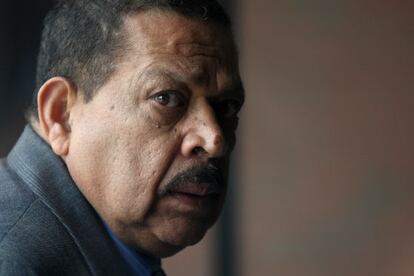US jails ex-Salvadoran military officer who faces charges for Jesuit murders
Former official lied when he applied for temporary refugee status

A former top Salvadoran military official, who faces state terrorism charges in Spain in connection with the 1989 murders of six Jesuit priests in his country, was sentenced last week by a federal court in Boston to 21 months in prison for violating US immigration laws.
After he completes his sentence, Inocente Orlando Montano, who was residing in the Boston area, will be deported to El Salvador where he will be held to answer charges regarding the murders.
Montano, 70, made false statements when he applied for Temporary Protective Status (TPS), which allows foreign nationals to remain in the United States if they face danger in their home country, according to a Justice Department press release dated August 27.
Montano, a citizen of El Salvador, served in the Salvadoran military for nearly 30 years, rising to the rank of colonel. From 1989 to 1992 — in the final years of a decade-long civil war — he served as the deputy minister for Public Security.
After the war, the UN Truth Commission on El Salvador found that there was substantial evidence that Montano was part of the small core group of elite officers responsible for the 1989 murder of six Jesuit priests — five of them Spanish nationals — their housekeeper, and the housekeeper's daughter.
Those murders, commonly referred to as the Jesuit Massacre, constitute one of the most notorious human rights crimes in El Salvador’s history, the Justice Department said.
The Spanish High Court charged Montano and the others with crimes against humanity and state terrorism in the case.
A UN commission report also named Montano as one of two top officials who covered up the military high command’s role in the massacre by pressuring lower-level soldiers not to mention orders from above in their testimony to the Salvadoran court officially charged with investigating the crime.
According to the Salvadoran government, Montano left the country at a time when events in El Salvador made it appear that high-level military officers would be prosecuted for their alleged role in the Jesuit Massacre.
Prosecutors asserted that the former Colonel Montano traveled to the United States, at least in part, to distance himself from authorities in El Salvador that could prosecute him for his alleged role in the atrocity.
He applied for a TPS in 2002.
Tu suscripción se está usando en otro dispositivo
¿Quieres añadir otro usuario a tu suscripción?
Si continúas leyendo en este dispositivo, no se podrá leer en el otro.
FlechaTu suscripción se está usando en otro dispositivo y solo puedes acceder a EL PAÍS desde un dispositivo a la vez.
Si quieres compartir tu cuenta, cambia tu suscripción a la modalidad Premium, así podrás añadir otro usuario. Cada uno accederá con su propia cuenta de email, lo que os permitirá personalizar vuestra experiencia en EL PAÍS.
¿Tienes una suscripción de empresa? Accede aquí para contratar más cuentas.
En el caso de no saber quién está usando tu cuenta, te recomendamos cambiar tu contraseña aquí.
Si decides continuar compartiendo tu cuenta, este mensaje se mostrará en tu dispositivo y en el de la otra persona que está usando tu cuenta de forma indefinida, afectando a tu experiencia de lectura. Puedes consultar aquí los términos y condiciones de la suscripción digital.








































